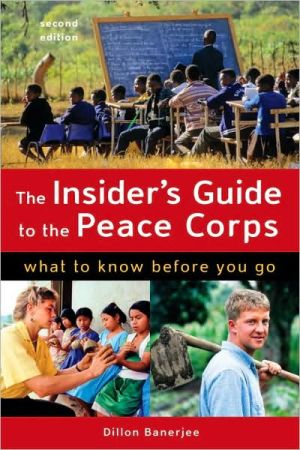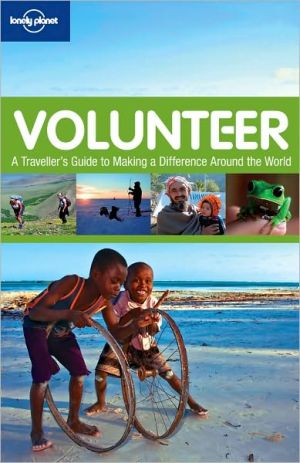The Insider's Guide to the Peace Corps: What to Know Before You Go
So, you want to join the Peace Corps . . . If you are interested in joining the Peace Corps, you probably have questions that run the gamut from "What is the application process like?" to "Is the Peace Corps effective as a development agency?" In this updated second edition, former Peace Corps volunteer Dillon Banerjee shares candid facts and insights about the experience in a practical question-and-answer format. With input from recently returned volunteers who served across the globe,...
Search in google:
So, you want to join the Peace Corps . . . If you are interested in joining the Peace Corps, you probably have questions that run the gamut from "What is the application process like?" to "Is the Peace Corps effective as a development agency?" In this updated second edition, former Peace Corps volunteer Dillon Banerjee shares candid facts and insights about the experience in a practical question-and-answer format. With input from recently returned volunteers who served across the globe, this thorough guide presents valuable information including: • What Peace Corps recruiters look for in your application• Items you should—and shouldn't—-pack for your two-year trip• Useful gadgets and technology that help volunteers stay connected from far away• Real answers to personal questions about culture shock, safety, dating, homesickness, and more Whether you're thinking of joining or have already been accepted and are preparing to leave, The Insider's Guide to the Peace Corps will help equip you for the unique challenges and rewards of the volunteer experience, regardless of your program area or country assignment. It's essential reading for anyone interested in "the toughest job you'll ever love."
1 What is the application process like? How long does it take? The application process can be arduous and seemingly endless. The Peace Corps receives over two hundred thousand inquiries each year from people interested in applying. Tens of thousands of those people submit applications, and only a fraction is eventually accepted. Besides the fact that the Peace Corps is a government agency—which, by definition, means it can be slow and bureaucratic—the sheer number of applicants combined with the excruciating detail each must provide on the application forms make it easy to understand why the review process can last up to a year. The Peace Corps tells potential recruits that three personality traits are invaluable during the application process: persistence, patience, and a sense of humor. Persistence is required because, try as they may, the Peace Corps does not always review every application and forward every file in a timely manner. Every so often you'll need to prod and encourage them to keep the process moving. I knew an applicant who, after submitting his completed application, sat back and waited to hear from the Peace Corps. He never followed up with calls; he never thought to check on the status of his application. After almost six months of waiting, he received a letter notifying him that his application had been deemed "inactive." Apparently, having never heard from him, his recruiter assumed he had lost interest in joining. Patience is a virtue for Peace Corps applicants simply because, even if you are persistent and hound the office with weekly calls, the entire process may take anywhere from four to twelve months. Why does it take so long? Because there are several steps one must take to navigate successfully through the system. In a nutshell, they are: 1. Filling out the application. This is no easy feat, though it has been made a bit less cumbersome now that the entire process can be completed online. From Peace Corps' official website (www.peacecorps.gov), you can create an account that allows you to access the application and complete it in stages at your convenience. You can also track your progress so you know where you are in the process at any given time. That said, the application still consists of seventeen distinct sections ranging from queries on personal and legal information to military status, language skills, and employment history. The Peace Corps demands an account of every relevant course, internship, summer job, and hobby that may qualify you for one of their programs. You must provide three references (one professional, one personal, and one from a volunteer work supervisor) and write two five hundred-word essays (detailing your motivation to apply, and any past cross-cultural experiences). The Office of Personnel Management (OPM) estimates that the Peace Corps application should take approximately eight hours to complete. In reality, expect to be filling in the blanks for days, if not weeks, due to the amount and depth of information requested. If you are unable to access or complete the forms online, you can request that Peace Corps send you hard copies so you can put pen to paper. 2. Passing an interview. Once your application has been reviewed, the Peace Corps determines whether or not you "fit" into any of their program areas. If you do, you will be called into the nearest Peace Corps office for an interview with a recruiter. If you are unable to attend in person, the interview may be conducted over the phone. This step of the process is a major screening tool for the Peace Corps. It is their forum for evaluating your level of commitment, maturity, and experience, and it is your golden opportunity to sell yourself, your skills, and your ambition. During the interview, expect to be grilled on your reasons for wanting to join, your expectations, your hopes and fears, your strengths and weaknesses, and your preferences with regard to the Peace Corps' geographic and program areas. They may also ask you whether or not you are dating anyone seriously—a red flag to help them identify volunteers who may quit before their two-year commitments are fulfilled (see questions 59 and 60 for more on early termination [ET]). You should treat the interview as you would any other job interview. Be professional, confident, assertive, and prepared. Many applicants assume they can wear shorts and a T-shirt, or show up without preparation since it's an interview for the Peace Corps. Recruiters will be turned off by that. They are not looking for applicants who come across as extremely liberal or laid-back; they're looking for the best-qualified applicants among thousands of competitors. 3. Securing a nomination. Assuming the interview goes well, your recruiter will "nominate" you for one of the Peace Corps' programs. Possibilities include education, youth outreach, community development, business development, environment, agriculture, health, HIV/AIDS, and information technology. For a complete description of Peace Corps programs, refer to appendix C. If you aren't slotted for a program that interests you, this would be the time to speak with your recruiter about revisiting your qualifications as they may relate to other programs. You'll also be told the region of the world in which you will most likely serve, the language requirements for that region, and your approximate date of departure. On the one hand, receiving such information boosts your morale and provides exciting news for friends and family. On the other hand, once the initial impact wears off, impatience and frustration tend to grow. You'll quickly realize how much of the picture is still missing. You won't know the exact country assignment, the actual date of departure, the specific language(s) you'll be learning, or the details of the projects you will be working on. This is usually the stage that applicants find the most trying. 4. Physical and legal screening. Step 4 is when you undergo a thorough medical, dental, and legal review, while the Peace Corps checks on all of your references and validates the information provided on your application. The physical, dental, and eye exams can all be conducted by your regular doctors; costs are reimbursed by the Peace Corps. Legal clearances include an FBI background check and a closer look at issues related to financial obligations or debts, dependents, and marital status. During this stage, your recruiter will also keep his or her eyes peeled for specific openings that suit your qualifications. Timing is everything at this point. If your medical exams go off without a hitch, hound the office to ensure that Peace Corps nurses review your file in a timely manner. Call your recruiter frequently to follow the progress of your background and reference check, and inquire about his or her efforts to place your name in an available and appropriate volunteer slot. 5. Receiving an invitation. The last stage of the application process is receiving the coveted "invitation" for a specific program, in a specific country, leaving on a specific day. You will be invited, for example, to teach English as a second language in Niger, leaving August 3. You'll have only ten days to accept the invitation, so do some quick research and some serious soul-searching to be sure that you are committed and willing to go. If you have doubts about the country to which you've been assigned—perhaps it's predominantly French-speaking, Muslim, and urban, whereas you had your hopes set on Spanish-speaking, animist, and rural—you may want to inquire about other possibilities. Be sure, though, that your doubts are substantial and reasonable, not impulsive or superficial, and communicate them clearly to your recruiter. If you bow out of your initial invitation because you've heard the food stinks and the beaches are dirty, you're likely not to receive another invitation down the line. If you feel your reasons are solid, however, consult your recruiter and ask about other possibilities opening in the near future that may be more in line with your desires and expectations. Stay flexible, and don't come across as demanding. Throughout the application process, remember to maintain a sense of humor. As I mentioned earlier, you're battling a bureaucracy that is deluged annually with paperwork. They deserve kudos for managing to process as much as they do, but to an eager applicant whose life hinges on their decisions, each snag along the way can lead to a nervous breakdown. If you learn to laugh when you'd rather scream, you'll be more likely to emerge from the application process unscathed. When you finally accept an invitation, you can breathe a huge sigh of relief and start spreading the word that you're going overseas to be a Peace Corps volunteer! You can begin reading up on your new country, contacting RPCVs who served there to ask them questions about their experiences and preparing your belongings for a unique packing effort (see question 11). You will have reached the end of a long and winding road, and should enjoy it before the beginning of a much longer and more winding road begins—the actual Peace Corps experience itself! Spend the intervening months between the invitation and departure doing all the things you need and want to do, knowing that it may be two years before you get the chance to do those things again. Say your good-byes, see your favorite band, go to the latest movie, eat your favorite foods, visit good friends, and spend quality time with family. All the while, cherish the fact that you have been selected to embark on an adventure that few others have the privilege of experiencing in their lifetimes, and know that you are about to discover new things about the world, about others, and about yourself. 2 Am I qualified to join the Peace Corps? The Peace Corps is asked this question frequently, and as a result has published a pamphlet entitled "Life is calling. How far will you go?" This resource provides an overview of Peace Corps' various program areas, along with the educational and experiential requirements applicants should meet to be considered for each one. I have included the overview as appendix C in this book to give you an idea of the skills needed for accomplishing projects within each program. I also, however, highly recommend that you request the full pamphlet from your local recruiting office, as it goes into greater detail on program prerequisites and desired qualifications. In addition to specific program requirements, be aware of a few core requirements all applicants must meet before joining the Peace Corps. Volunteers must, for example, be U.S. citizens at least eighteen years old and in good health (there is no upper age limit). Most PCVs (95 percent) have bachelor's degrees, and several have advanced degrees and/or related prior work experience. Married couples with dependent children are generally not accepted into the Peace Corps unless there is a compelling need for their specific skills; those without dependents may be accepted if both qualify for volunteer assignments (see question 3). All applicants must undergo a comprehensive medical and dental evaluation certifying that they are capable of handling the physical and emotional rigors of Peace Corps service. When completing the application forms, be sure to include every bit of related experience that comes to mind. Oftentimes applicants don't realize how important it is to be absolutely and completely thorough. If you spent a summer helping your mom with gardening in the backyard, you may qualify for the Peace Corps' agriculture or forestry program. If you took a CPR course as part of your Boy Scout merit badge, you may be selected for the health education program. If you took two years of high school Spanish, volunteered for a few days at a food shelter, or organized a backcountry camping expedition with your friends, include it on your application. Roughly 50 percent of PCVs hold liberal arts degrees, which means their technical experience often comes from extracurricular activities, summer jobs, or personal hobbies. No matter how trivial or inane some of your previous experiences may seem to you, if it sounds even remotely related to a Peace Corps program, jot it down. 3 What if I'm married and we both want to join? Go for it! Peace Corps statistics show that 7 percent of all volunteers are married. There is even an official one-pager entitled "Joining Peace Corps as a Couple," which addresses the application process, eligibility, and preparation for service (see appendix J). There were a few married Peace Corps volunteers in Cameroon during my time there. One couple had recently retired and were serving as teachers in a vocational school; another were newlyweds who had decided to join the Peace Corps before having kids, mortgages, and all that good stuff. From my observations, both had good experiences and were glad they joined. If you are married and are considering the Peace Corps, though, you should be aware of a few things. First, the application process can be much longer for married couples. The Peace Corps places volunteers by matching program needs, as determined by requests from host country governments, with the skills of its applicants. Placing two people in the same country simultaneously requires requests from a country for volunteers under both programs for which the two qualify. In other words, if you are nominated to be an agroforestry volunteer and your spouse is slated for the health program, you must wait until a country has openings for both and hope that you can fill those spots simultaneously. There may also be complications if the training schedules for your programs are not synchronized. It may be that agroforestry in-country training starts in June, while health training doesn't start until September. These are just some of the kinks married couples face that may take the Peace Corps some time to iron out. The Peace Corps will also want you to be aware that, if you are married, you may be tempted to lean more on your spouse than on other volunteers or villagers for support, guidance, and companionship. Although, to a degree, this is natural and expected, if taken to an extreme it can result in couples feeling isolated from peers, counterparts, neighbors, and friends. Tensions can also arise if one spouse acculturates more easily, proves more adept at learning languages, or is more technically proficient than the other. These tensions may be exacerbated in newlyweds who haven't yet had the chance to mature in their marriages. Perhaps for this reason, married couples have a slightly higher ET rate than single volunteers, which is something to bear in mind. Don't be discouraged, however, as the majority of married couples in the Peace Corps have served successfully and rewardingly. My advice is to contact the Peace Corps or send out inquiries on the Internet to communicate with returned volunteers who served with their spouses, and ask them about their experiences and for their counsel. 4 Can I serve in the Peace Corps with my boyfriend or girlfriend? No. The only way to enter the Peace Corps with a partner and be posted in the same village is to be married. Otherwise there are no guarantees that the two of you will even end up on the same continent. In fact, if you are involved in a serious relationship, be aware that the Peace Corps will inquire about the nature of that relationship during the application process. If they perceive it to be potentially problematic, they may have you complete a Romantic Involvement Worksheet used to "educate" applicants on the ways in which a Peace Corps commitment can strain personal relationships (see appendix I). If they conclude that your emotional attachment is substantial, it will count as a strike against you. This is because a significant number of people who early terminate do so as a direct result of feeling homesick for their boyfriends or girlfriends. Many people get so wrapped up in the adventurous and romantic notion of becoming a Peace Corps volunteer in a foreign country, that they underestimate the feelings of isolation, loneliness, and insecurity that arise from time to time during the experience—feelings that may be compounded if the volunteer has left someone special back home. Most volunteers I know who left a boyfriend or girlfriend behind to join the Peace Corps were not in those relationships two years down the road. Distance and time are two skilled assassins of even the strongest bonds, and in the Peace Corps, they tend to be armed and dangerous.
Acknowledgments iPeace Corps Acronyms xPreface 1I Pre-Application Jitters1 What is the application process like? How long does it take? 42 Am I qualified to join the Peace Corps? 93 What if I'm married and we both want to join? 114 Can I serve in the Peace Corps with my boyfriend or girlfriend? 135 What will my Peace Corps experience be like if I'm an "older" volunteer? 146 What will my Peace Corps experience be like if I'm gay? 167 What will my Peace Corps experience be like if I'm a minority? 188 Will the two years go by quickly or slowly? 209 Will I be lonely? 2210 What will I miss the most? 24II How to Pack for a Two-Year Trip11 What should I bring? 2612 Can I really pack only eighty pounds to take with me? 3013 What kinds of games and toys should I bring? 3214 How many books should I bring? 3315 What about the water? Will I need a purifier? 3416 Can I bring my pet overseas with me? 36III Peace Corps Training-Learning the Ropes17 What is training like? 3818 How hard will it be to learn the language? What language(s) will I learn? 4119 Will I have enough technical training to do my job? 43IV Managing Your Money20 How will I get paid? Where will I keep my money? 4621 Will I have enough money? Should I bring extra money with me? 48V Living Like the Locals22 Will I live in a mud hut? Will I have electricity or running water? 5223 How will I wash my clothes? Do my dishes? Clean my house? 5524 What is the food like? 5725 What if I'm a vegetarian? 5826 Can I buy or adopt a pet overseas? 6027 How will my neighbors and collegues view me? 6128 How will I travel around my work area? 63VICommon Medical and Safety Concerns29 Will I get sick? 6630 Will I get worms? 6831 Will I lose weight? Gain weight? 7032 What medical services will be available to me? 7133 What if I become too sick to reach help? 7434 What if I get pregnant or impregnate someone while I'm in the Peace Corps? 7535 Is AIDS a big concern for Peace Corps volunteers? 7736 What if there is a crisis and I have to be evacuated from my post? 7937 Do local police and government officials harass volunteers? 8038 Is sexual harassment a problem for female volunteers? 81VII Staying in Touch with Home39 How will I receive mail in the Peace Corps? 8440 Will people be able to send me things through the embassy's diplomatic mail pouch? 8841 Can I get magazine subscriptions sent to me? 8942 Will I be able to call the States? 90VIII Peace Corps Gadgets and Technology43 Will I have access to the Internet? 9444 Should I bring my laptop? 9645 Will I be able to use a cell phone in the field? 9846 Should I bring a digital camera? GPS unit? MP3 player? 10047 Do I need a shortwave radio? 102IX The Social Scene48 How close will I live to another volunteer? 10449 How often will I see other volunteers? 10650 What is the drug and alcohol situation like? 10851 What is the dating scene like in the Peace Corps? 11052 What happens if I want to marry a host country national? 112X The Toughest Job You'll Ever Love?53 What is the work schedule like? 11454 How much supervision is there for volunteers in the field? 11555 Will I work with other international development agencies while I'm overseas? 11756 Is the Peace Corps effective as a development agency? 11957 What are some common criticisms of the Peace Corps? 121XI Rules to Live By-Peace Corps Policy58 Will I be able to have friends and family visit from the States? 12459 How often do volunteers quit before their two years are over? 12660 What is the procedure for quitting early? 12961 Can I get kicked out of the Peace Corps? 13162 How many volunteers extend their service beyond the first two years? 13363 Will I be overseas for the whole two years or can I come home in between? 13564 Can I transfer programs if I don't like what I'm doing? 13665 Can I transfer countries if I don't like where I am? 13866 Will I have access to embassy, commissary, and American Club services? 139XII Traveling Like a Pro67 Will I have the opportunity to travel much during my two years as a volunteer? 14268 Can I travel to other countries after my Peace Corps service is over? 14469 Will I be issued a diplomatic passport? 146XIII Post-Peace Corps70 How hard is readjusting to life back in the States? 14871 Does the Peace Corps look good on a resume? Will it help me get into graduate school? 15172 What is "noncompetitive eligibility" and what can it do for me? 15373 Can I bring my Peace Corps pet back to the States with me? 15474 Would you go back and do the Peace Corps all over again? 155AppendicesA Peace Corps General Facts 158B Peace Corps Country Map 159C Peace Corps Programs Overview 160D Medical Information for Applicants 163E Peace Corps Master's International Program 166F Peace Corps Regional Offices 169G Peace Corps Information Online 171H Vegetarian Questionnaire 173I Romantic Involvement Worksheet 175J Joining Peace Corps as a Couple 176K Volunteering at Age 50+ 177Index 179About the Author 182








